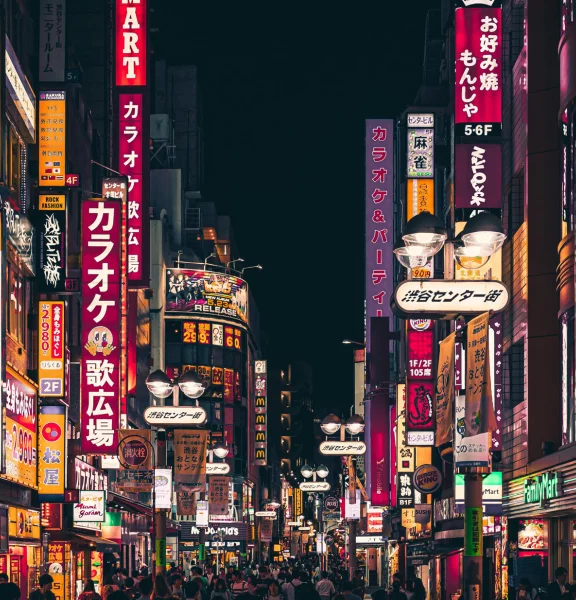Get your own personalized 360° MBA Ranking now.
Get a free consultation

International MBA students
Student satisfaction rate
Schools accredited by AACSB, AMBA or EQUIS
Average annual salary
Your guide to studying in Japan
Japan offers a unique blend of the ultra-modern (like cutting-edge robotics) and the deeply traditional (like the art of the tea ceremony). The Land of the Rising Sun is where ancient history and modern pop culture live harmoniously hand-in-hand. International students who are looking for an excellent education that also incorporates new technology and research facilities will find it in Japan. The country’s famous hospitality and safety further transform the study experience into an unforgettable journey for foreigners. With its efficient public transportation system, Japan’s diverse sights and world-renowned cuisine are easy to explore.
Cultural Specifics of Japan
When in Japan, it’s important to recognize and respect local traditions and cultural specifics. For example, Japanese people bow upon greeting each other – the depth and duration of the bow further indicates the level of respect. They also make sure to take their shoes off when entering another person’s home, which speaks of the Japanese emphasis on cleanliness and separation of spaces. Communication is rather indirect so try to avoid confrontation. Local interactions are deeply influenced by wanting to maintain one’s dignity and avoid embarrassment.
The culture of gift giving is big in Japan and it goes beyond just commemorating special occasions, with different types of gifts being suitable for different moments. Hierarchical structures carry great importance in the country – respect for elders and higher-ups dictates both social and professional interactions.
Business Culture in Japan
Tradition and respect are some of the main characteristics of Japanese business culture. Since society in Japan is generally collectivistic, professionals prefer making decisions together and they value group harmony over direct confrontation. They communicate politely, often using subtle cues instead of being direct. Punctuality in business meetings and potential partnerships can go a long way – being late is considered highly disrespectful. Business cards, or “meishi”, are everywhere in Japan and it is customary to exchange them when introducing yourself in professional settings.
Don’t be surprised if you’re invited out for drinks or dinner with colleagues – building relationships is important to people in Japan as an opportunity to foster mutual trust and understanding.
The experiences of students and alumni in Japan
Podcast special from Unimy, Unimy and Beyond, and Prepadivser. How and why should you use culture to find your best MBA?
Do you need an MBA coaching session? Would you like to hear advice directly from MBA alumni? Here is how you can get those opportunities, for free.
Advantages of the MBA programs in Japan
Of the only 129 schools globally that hold the coveted Triple Crown accreditation, 1 university in Japan is accredited by AACSB, EQUIS, and AMBA – a marker of high educational standards and international credibility.
Financial aid and scholarships are available for international students headed to Japan in the form of university-specific scholarships and support from local governments and private organizations. For example, the prestigious MEXT (Japanese Government) Scholarship can help with tuition fee waivers, monthly stipends, and even airfare.
Japan’s MBA programs are becoming more and more recognized for their future-oriented curricula and global focus – many universities now offer courses in English. Studying in Japan provides students with unique networking opportunities, particularly in connecting them with local companies or international corporations with offices in Japan. The skills and cultural understanding gained during an MBA in Japan are invaluable, especially in sectors where the Asian country is a global leader, such as technology and manufacturing.
COMMON EXPENSES AND LEGAL ASPECTS
Cost of living
Rent of one-bedroom apartment in city center (monthly): ¥79,536.64
Basic utilities (monthly): ¥25,501.42
Public transport pass (monthly): ¥8,000.00
Gym subscription (monthly): ¥8,551.46
Water (1.5-liter bottle): ¥128.38
Source: Numbeo
Visa requirements and work permits
For all international students planning to do their MBA in Japan, it will be necessary to obtain a student visa. Next to an acceptance letter from a recognized Japanese institution, non-Japanese MBA candidates need to prepare proof of sufficient financial resources to cover tuition and living expenses. The student visa allows having a part-time job (up to 28 hours per week), but students must first get special permission from the immigration office to be able to work. After graduating from business school, internationals can apply for a work visa if they secure a job offer in Japan.
FEATURED SCHOOLS IN Japan

Available programs:


Explore the most popular MBA programs in Japan
You might also be interested in...
Request a consultation
Get a free consultation with our expert advisors and discover the MBA that best suits your profile and aspirations.
